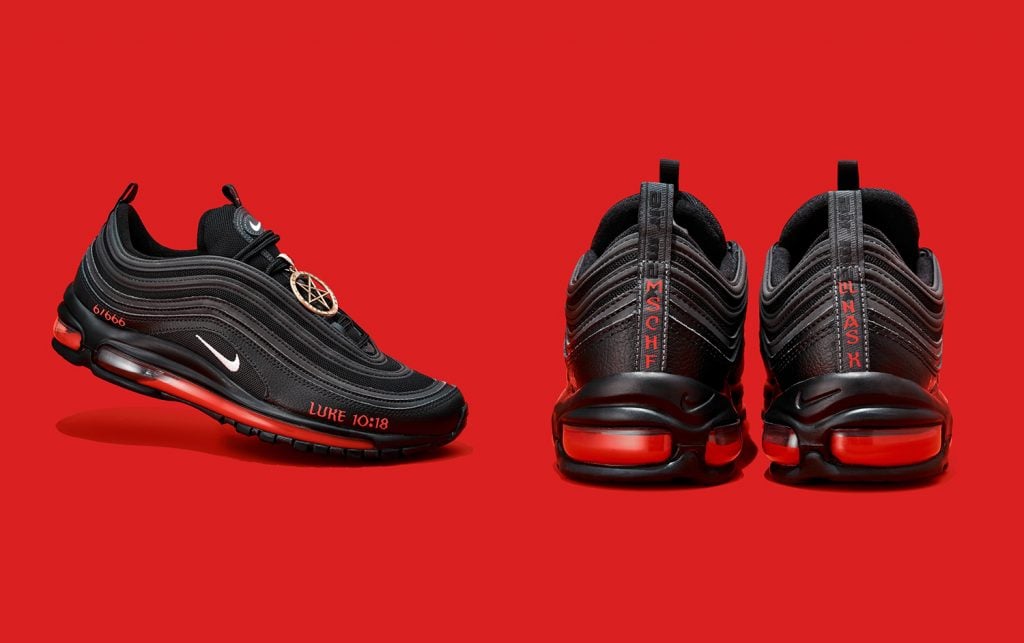Pop Culture
The Art Collective That Nike Sued for Pouring Human Blood on Its Sneakers Has Agreed to Recall the Shoes
The group's lawyer says the shoes were intended as a comment on "collaboration culture."

The group's lawyer says the shoes were intended as a comment on "collaboration culture."

Taylor Dafoe

The battle between Nike and the art and design collective MSCHF has finally been settled.
Last month, the collective teamed up with rapper Lil Nas X to release “Satan Shoes,” a series of modified Nike Air Max 97s sneakers with drops of human blood mainlined into the soles. Priced at $1,018 per pair and produced in an edition of 666, the shoes sold out in less than a minute.
But not everyone was a fan—especially not Nike, which sued MSCHF for trademark infringement and was subsequently granted a temporary restraining order against the studio by a U.S. District Court judge.
Now, as part of an out-of-court settlement with the clothing company, MSCHF will offer to purchase back the sneakers from each buyer at the original price, according to a statement Nike provided to Artnet News. The collective will also offer refunds to those who bought “Jesus Shoes,” a 2019 series of altered Nike Air Max sneakers with holy water from the River Jordan injected into the soles.
Whether or not customers will actually return the shoes is another question. The refund will likely provide little incentive, given the robust resale market. Numerous pairs of Satan Shoes are available on eBay now with price tags ranging from to $3,800 to $6,666.
Further details about the deal were not disclosed, but it effectively ends the lawsuit between the company and the art collective.
“The parties are pleased to put this dispute behind them,” Nike said in a statement. MSCHF’s lawyer, David H. Bernstein, similarly said his clients were “pleased” with the agreement.
“With these Satan Shoes, MSCHF intended to comment on the absurdity of the collaboration culture practiced by some brands, and about the perniciousness of intolerance,” he said. “Having already achieved its artistic purpose, MSCHF recognized that settlement was the best way to allow it to put this lawsuit behind it so that it could dedicate its time to new artistic and expressive projects.”
Calling the shoes “works of art that [that] represent the ideals of equality and inclusion,” Bernstein added that the lawsuit “brought extraordinary publicity” to MSCHF and its artistic message.
Bernstein’s firm similarly declined to share any further details about the settlement.
MSCHF’s Satan Shoes were released on Friday, March 26—the eve of Holy Week—and coincided with the release of Nas X’s music video for his song “Montero (Call Me By Your Name),” in which the rapper reimagines biblical scenes through a queer lens.
y’all keep streaming call me by your name so i can pay for this damn nike lawsuit ?
— nope ? (@LilNasX) April 9, 2021
In one scene, he descends into hell on a stripper pole before giving the devil a lewd lap dance. The video has since been viewed over 100 million times on Youtube, while the song has posted similar numbers on Spotify.
On MSCHF’s website, a link to the Satan Shoes project now leads to the collective’s statement on the dispute with Nike.
“Satan Shoes started a conversation, while also living natively in its space,” the statement says. “It is art created for people to observe, speculate on, purchase, and own. Heresy only exists in relation to doctrine: who is Nike to censor one but not the other?”